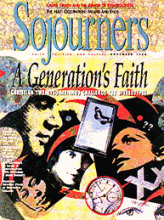Back in the late 1980s, I thought I was the ultimate twentysomething. Not because I fit a certain typeliberal activist or young Republican or slackerbut because I was connected to different factions simultaneously.
Sure, I wasama (democratic) socialist at heart, but some of my best friends are the guys I grew up with, most of whom are conservative, or at least apolitical. I could change stripes at will, transversing what I thought was the Gen X universe in the same night: from the nightclubs in downtown Washington, D.C., (with their self-conscious, politically astute but humorless clientele) to a beer bash in the burbs (with the brash and very funnyin a Howard Stern-esque kind of way) boys from prep school.
However, when the 80s became the 90s and Gen X got more and more media attention, I began to have doubts about my stature as the baby-buster representative. It seemed that Generation X wasnt anything more than a cloud of smoke generated by trend-chasing magazine editors and the corporate hype machine hungry to hook young consumers.
Upon reflection I realized that I wasnt a spokesperson for my peers as much as a member of two tribes that were isolated from each otherand from other groups, like inner-city hip-hoppers, gay acti-vists, and Latinos. The alienation being peddled as post-boom angst wasnt generational, but a more general societal malaise that was reflected in the countrys young. As twentysomething Alexander Star wrote in "The Twentysomething Myth," an article in The New Republic: "As young people acquire adult responsibilities (and adult vices) at an earlier age, their distinctness as a group diminishes. They do not stamp a unique sensibility on society as much as mirror its disarray."
Read the Full Article
